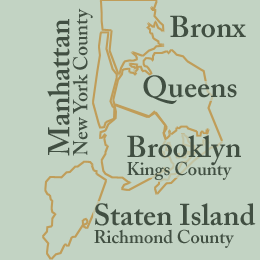Stays After Entry of Judgment in a Holdover Proceeding
In General: Stay Of Enforcement Of Judgment Or
Order Without Appeal
Obtaining a Maximum Twelve-Month Stay
Breach Of The Lease
Automatic Stay After Filing Bankruptcy Petition
In General: Stay Of Enforcement Of Judgment Or Order Without Appeal
A tenant who lost at trial and seeks to stay the issuance of the warrant of eviction must apply to the judge who granted the landlord the judgment.
A landlord or a tenant seeking to obtain an extension of time to comply with orders to pay moneys, vacate the premises or make repairs, or to correct mathematical errors may be determined by any judge.
The court has the general power to stay proceedings in a proper case upon such terms as may be just, as well as specific powers as discussed below.
In order to obtain a stay you can come to court and fill out an Order to Show Cause. To read more about this process click on Orders To Show Cause. To find out where to go in your county, click on Locations.
To learn about stays of enforcement of judgments when appealing, click on Appeals.
Obtaining a Maximum Six-Month Stay
A tenant who is the losing party in a holdover proceeding may ask the court for a stay of up to 12 months to relocate. The tenant must show he/she cannot find similar housing after a good faith, reasonable effort, or that extreme hardship to the tenant or his/her family would result without the stay. Such a stay is conditioned upon payment as the court shall direct for use and occupancy. Although the court has the discretion to grant a stay of up to six months, the tenant may get less time.
This 12-month stay is not available where the landlord demonstrates he or she desires in good faith to demolish the building, intends to construct a new building and such plans have been duly filed and approved. The stay is also not available where the landlord claimed that the tenant is objectionable and has been found objectionable.
To learn more about the law which gives the judge the discretion to grant a stay after judgment of up to 12 months, click on Real Property Actions and Proceedings Law section 753.
The court will stay issuance of the warrant of eviction for 30 days for a tenant or lessee who lost a holdover proceeding based upon a claim of breach of the lease. During that time the tenant or lessee may correct such breach.
Automatic Stay
After Filing Bankruptcy Petition
When a residential tenant files a bankruptcy petition, an automatic
stay prevents the landlord from bringing or continuing a case to
obtain possession and from enforcing a judgment obtained before
the commencement of the bankruptcy case. The purpose of the stay
is to give the debtor a breathing spell from his creditors.
The automatic stay only applies to proceedings concerning property in which the debtor has an interest at the time the bankruptcy proceeding is filed.
In landlord/tenant cases the court may determine that the tenant no longer has an interest to protect at the time of filing a bankruptcy petition if the warrant of eviction has already issued. In both the New York State courts and the federal Bankruptcy Court, depending on the facts of the individual cases, the issuance of the warrant of eviction may or may not be a sufficient basis upon which to lift or modify the automatic stay, or to conclude that the bankruptcy petition did not qualify for an automatic stay.
After a tenant files for bankruptcy a landlord may seek to have
the stay in Bankruptcy Court vacated in order to commence or continue
an eviction proceeding. The Bankruptcy Court may terminate, modify
or condition such stay based upon various factors, including payment
of ongoing rent, the condition of the premises and the equities
of the case. If the stay in Bankruptcy Court is lifted, the Civil
Court will have jurisdiction to hear and decide the eviction
proceeding, and the landlord who obtains a judgment and warrant
of eviction will be able to evict the tenant.
If the tenant’s debt, which includes past rent due, is discharged
at the conclusion of the bankruptcy proceeding, the landlord may
then seek recovery of the premises and eviction of the tenant/debtor.
This is because while the debt may have been discharged, it has
not been extinguished, and discharge of debt is not equivalent to
payment of debt. A discharge only prevents a creditor from proceeding
against a debtor on the debt as a personal liability, but does not
eliminate any of the other consequences of that debt. Therefore,
as long as the landlord does not attempt to obtain a money judgment
for a discharged debt, the landlord is free to commence a nonpayment
proceeding to recover possession. Thus a landlord may evict the
tenant/debtor for his/her failure to pay rent which has been discharged
in bankruptcy.
A debtor may voluntarily repay a debt that has been discharged even
though the debt can no longer be legally enforced.
To find the Bankruptcy Court in your county, click on Locations.


